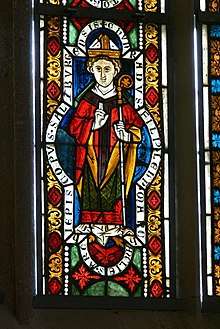Conrad II, Archbishop of Salzburg

Conrad I of Babenberg was Bishop of Passau from 1148/1149 - 1164. He was the son of Leopold III, Margrave of Austria and Agnes von Waiblingen and also Archbishop of Salzburg (as Conrad II)
Life
Conrad came from the Austrian Babenbergs. As the son of Leopold III, and the newly married Agnes von Waiblingen, he was a brother of the famous historian Otto von Freising and Duke Heinrich Jasomirgott of Bavaria and Austria, a half-brother of Konrad III. And a (semi-)uncle to Kaiser Friedrich Barbarossas. Konrad became 1140 Dompropst of Utrecht, and also 1143 Dompropst of Hildesheim. In 1148 he became Conrad I, Bishop of Passau. In 1159 he gave the citizens of Sankt Pölten a jurisdiction which is controversially discussed as the oldest city right of Austria.[1][2][3][4] The clergyman was elected archbishop of Salzburg on 29 June 1164. In the papal schism, he took a very cautious position and avoided any visible conquest for Pope Alexander III, while the majority of the members of the Salzburg cathedral chapter and of the Salzburg ministers at that time were responsible for Alexander III. Party. In 1164, however, Konrad also rejected the recognition of the imperial counterpart Paschal II, which was why the emperor refused to grant him the shelves, without which, according to the imperial conception, he could not get secular sovereign rights in his country. There followed several times the Emperor's requests to join his party. In Nuremberg, Konrad was accused at the beginning of 1166 of having illegally placed himself in the possession of the archbishop, but a conviction was not forthcoming. On March 29, 1166, however, the Emperor decreed the Reichsacht in Salzburger Laufen, through the Archbishopric of Salzburg. Salzburg had to pass a hard test in the coming years, which a contemporary named "history of disaster" (historia calamitatum). All the Salzburg fiefs, as well as the proprietary goods, were given by the Emperor to loyal imperial emperors. When the city of Salzburg burned down together with the cathedral in 1167, it was blamed on the mighty Earl of Plain, who allegedly had the imperial commission to set the city on fire. After initial successes of Friedrich Barbarossa, who with his strong army Alexander III. In Rome, Barbarossa had to return to Germany after a malaria epidemic that was rampant in the German army. The Salzburg archbishop passed away shortly after the Emperor's return to Germany.
References
- ↑ Heinz Dopsch, Hans Spatzenegger (Hrsg.): Geschichte Salzburgs, Stadt und Land. Pustet, Salzburg 1988; ISBN 3-7025-0243-2
- ↑ Johannes Neuhardt: Konrad II. Metropolit. In: Biographisch-Bibliographisches Kirchenlexikon (BBKL). Band 4, Bautz, Herzberg 1992, ISBN 3-88309-038-7, p.433.
- ↑ Kurt Zeillinger: Konrad II.. In: Neue Deutsche Biographie (NDB). Band 12, Duncker & Humblot, (Berlin, 1980), ISBN 3-428-00193-1, p525 (Digitalisat).
- ↑ Heinrich von Zeißberg: Konrad II. In: Allgemeine Deutsche Biographie (ADB). Band 16, Duncker & Humblot, Leipzig 1882, p.615–617.